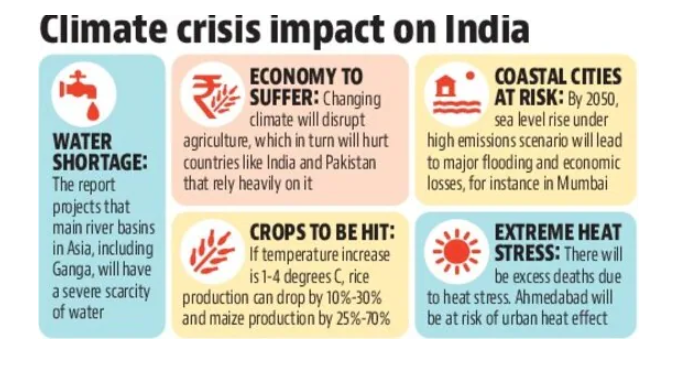- Home
- Prelims
- Mains
- Current Affairs
- Study Materials
- Test Series
The climate crisis worsens
The Intergovernmental Panel on Climate Change (IPCC)’s report, Climate Change 2022: Impacts, Adaptation and Vulnerability is an unvarnished account of the expanding footprint of the climate crisis on the world.
The IPCC Report on Climate Change

- According to the study, at least 40% of the world's population is highly vulnerable.
- About half half of the species assessed globally have shifted poleward or to higher elevations, and the local loss of hundreds of species has been driven by increases in the magnitude of heat extremes.
- It comes along with various interacting factors likely to increase food prices, reduce household incomes, and lead to malnutrition and climate-related deaths, especially in tropical regions.
- The possible irreversible impacts of the climate crisis may include mass mortality events on land and ocean, first climate driven extinction, loss of hundreds of local species, death and disease due to extreme heat.
- The risks are becoming more challenging to manage because of coincidence of multiple hazards, the extent and magnitude of the impact also more significant than previous estimations.
- Global warming would also impact food security and weaken soil health and ecosystem services like pollination.
- There are various interacting factors likely to increase food prices, reduce household incomes, and lead to malnutrition and climate-related deaths, especially in tropical regions.
- There is likely to be a very high risk of widespread biodiversity loss with massive impacts on kelp and seagrass ecosystems; and high to very high impact in Arctic sea-ice and terrestrial ecosystems and warm-water coral reefs.
- The report has warned that accelerating sea level rise would encroach on coastal infrastructure causing low-lying coastal ecosystems to submerge.
- There would be widespread and irreversible impacts on polar, mountain, and coastal ecosystems due to glacier melt and sea level rise even if the global mean temperature rises transiently, overshooting the 1.5°C threshold.
- The IPCC said that the Climate crisis has also impacted the physical and mental health of people. In all regions, globally extreme heat events have resulted in human mortality and morbidity.
- The several mental health challenges are associated with increasing temperatures, trauma from weather and climate extreme events and loss of livelihoods and culture.
- The occurrence of climate-related food- and water-borne diseases has increased, and vector-borne diseases have also spiked from range expansion and increased reproduction of disease vectors.
- Animal and human diseases, including zoonoses, are also emerging in new areas.
- The higher temperatures, increased rain and flooding have increased the occurrence of diarrhoeal diseases, which the world had once conquered, including cholera and other gastrointestinal infections.
- The report underlined that vulnerability of ecosystems and people to climate change differs substantially among regions mainly due to socio-economic development, unsustainable ocean and land use, inequity, marginalization, historical and ongoing patterns of inequity such as colonialism, and governance.

- India has been facing the brunt of the climate crisis for years now.
- The news is grim for Asia as well as India, The international transboundary river basins could face severe water scarcity by 2050.
- Ahmedabad has a high-risk from heat and Mumbai from floods and sea level rise.
- The economy of India could be damaged due to continued warming, particularly if emissions are not rapidly eliminated.
- According to a 2021 study by the Council for Energy, Environment and Water, about 75% of Indian districts, including 95% of the coastal ones are extreme climate event hotspots.
- Though India has made bold promises at the COP26 summit, The latest IPCC report indicates the Centre and states to increase the pace of implementation and employ a climate lens while designing large-scale projects affecting the environment.
- There needs to be a greater synergy among the national, state and district action plans, while many states and few districts have formulated climate action plans.
- According to many experts India needs a separate climate crisis Ministry for achieving this.









 Latest News
Latest News
 General Studies
General Studies